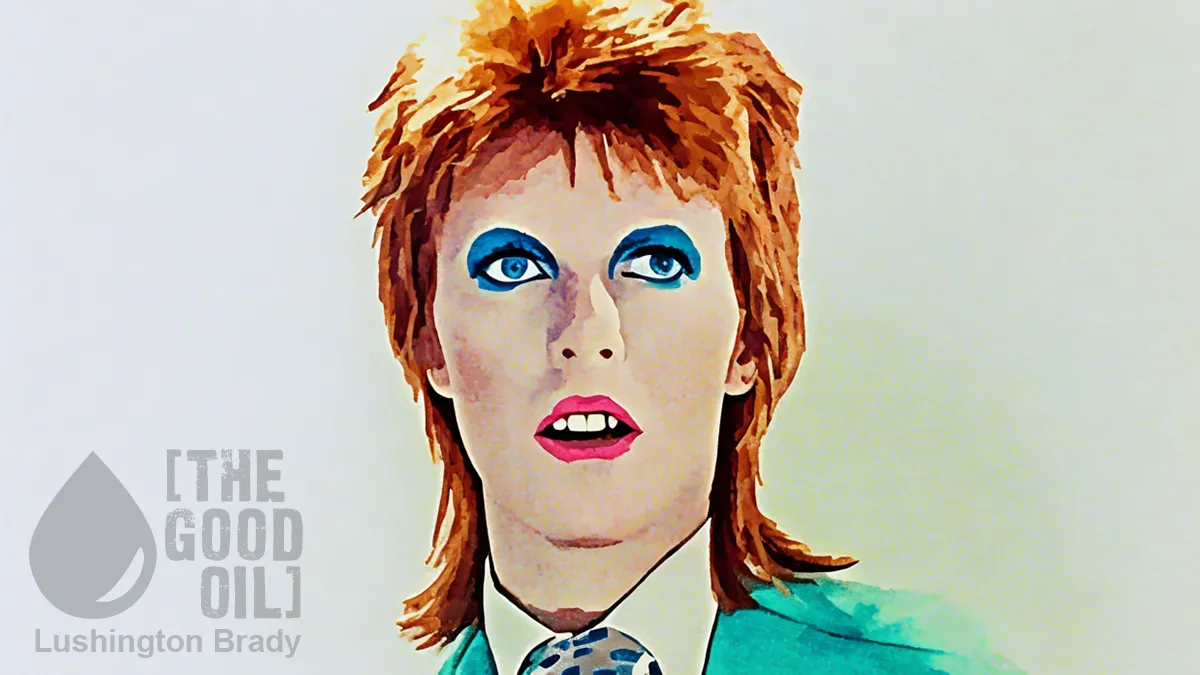Table of Contents
Legend has it that, in the mid-’70s, Nancy Sinatra was shopping around the idea of a biopic of her dad, with the suggestion that David Bowie play the lead. Frank allegedly nixed the idea of having an ‘orange-haired English faggot’ play him, and that was the end of that.
But the connection between Bowie and Frank Sinatra is a lot more tangled than that and links what are the signature tunes for each: “Life on Mars?” and “My Way”.
By the time he released “Life on Mars?” and his fourth album Hunky Dory, Bowie had spent years working his way up from jobbing songwriter to rock stardom. While both sold well on release, they didn’t quite propel him to rock superstardom. It was only when Aladdin Sane had truly made Bowie an icon that fans began to re-evaluate Hunky Dory and realise just what a classic it was. “Life on Mars?” similarly became possibly his most highly regarded song, indeed regarded by some as one of the greatest rock songs ever.
What possible connection, though, could this semi-abstract, surrealist tale of ‘the girl with the mousey hair’, have to do Ol’ Blue Eyes’ show-stopper?
We owe “My Way” to a Frenchman born in Egypt whose parents were forced to flee when Nasser seized the Suez Canal, plus a Syrian-Lebanese family whose patriarch took it upon himself to hang an unpunished child rapist and then emigrated to Canada where the immigration official mistook the anecdote for the family name and registered them now and forever as “Anka” (“noose”). And if you think that’s an unlikely combination of sources for Frank Sinatra’s signature song, well, it could have been wackier still: Between the Egyptian Frenchman and the Lebanese Canadian came a young South Londoner called David Bowie.
“Comme D’habitude” (“As Usual”) was a typical French ballad of post-coital, femme méchante, indifference, released in 1967 by French pop singer Claude François. A hit in France, it set music execs to thinking there would be a buck in releasing an English version. The job was handed to a then-unknown songwriter named David Jones, or, that name being suddenly made famous by the Mancunian quarter of the Monkees, the stage-name he adopted: David Bowie.
Thinking to pitch the song for then-star Anthony Newley, Bowie wrote the suitably (for Newley) maudlin first English lyrics for the tune. Bowie duly recorded himself singing over the top of Claude François and sent it in. The French publishers were not impressed and Bowie’s version withered on the vine.
So they handed the job on to teen idol and sought-after composer Paul Anka. The name ‘Anka’, by the way, means ‘noose’. The family had fled Syria after the family head took it on himself to hang a child molester. Somewhere in the immigration process to Canada, the nickname became the family name passed down to the Syrian vigilante’s grandson.
Anka, who spoke French, thought “it was a shit song”, but… the tune kept “gnawing at me”. Anka was acquainted with veteran crooner Sinatra though a mutual friend. Sinatra had mused to Anka over dinner that he was sick of the business and was doing one more album and getting out. Anka figured, if he was ever going to write a song for Sinatra, he’d better get cracking.
So, he set to work moulding “Comme D’habitude” into something Sinatra-worthy. Was it going to be a swan song for the great man’s career? Inspiration struck.
And now, the end is near. And so I face the final curtain.
The rest is history.
Young David Bowie, meanwhile, was pretty “pissed off” at being passed over, especially when he started hearing the tune, with someone else’s words, all over the radio. “That really made me angry for so long – for about a year ... eventually I thought, I can write something as big as that, and I’ll write one that sounds a bit like it.” So, he pinched the opening chord progression of “My Way” and set out to parody it. Hence, on the liner notes for “Hunky Dory”, the sardonic acknowledgement that “Life of Mars?” was “inspired by Frankie”.
Unlike the bombastic melodrama of “My Way”, “Life of Mars?” is a lyrically complex, surreal commentary on mass media versus real life. The girl who walks in a sunken dream becomes hooked to the silver screen. But, for all its kaleidoscopic whirl through fractured cinematic imagery, the film is a saddening bore.
“I think she finds herself disappointed with reality,” Bowie commented. “That although she’s living in the doldrums of reality, she’s being told that there’s a far greater life somewhere, and she’s bitterly disappointed that she doesn’t have access to it.”
But if his protagonist was disappointed, Bowie certainly wasn’t: the song not only became one of his greatest, but the accompanying film clip set the iconic image of Bowie for the ’70s. Simple in the extreme, nevertheless, its stark, washed-out imagery of a ghostly Bowie with his signature shock of hair and androgynous makeup, not to mention the opening closeup on his famously mis-matched eyes, was instantly mesmerising.
And the orange-haired English faggot got the last laugh on Sinatra. Because Sinatra came to thoroughly dislike the song that became his showstopper, whether he liked it or not.
“Every time I get up to sing that song,” Sinatra told Ervin Drake (composer of “It Was A Very Good Year”), “I grit my teeth, because no matter what the image may seem to be, I hate boastfulness in others. I hate immodesty, and that’s how I feel every time I sing the song.”
As a final note on the long, winding road from Sinatra to “Life on Mars?”, it’s an interesting bit of trivia that the piano line was played by Rick Wakeman, who said that “I remember leaving [the studio] and saying to a couple of friends that I met that evening in a local pub that I’d just played on the best song that I’d ever had the privilege to work on.”
But the really kicker trivia is that Wakeman recorded the song playing on the same piano the Beatles had used to record “Hey Jude” and which was later tinkled by Elton John on Goodbye Yellow Brick Road and by Queen on several albums. But not “Bohemian Rhapsody”.









